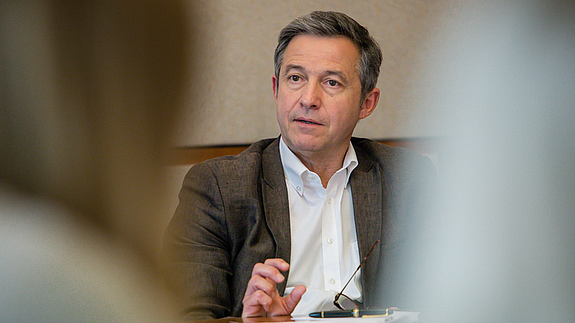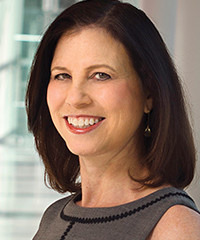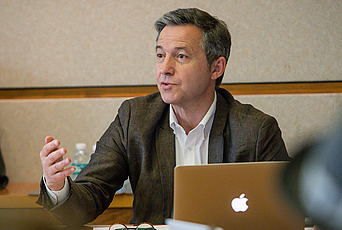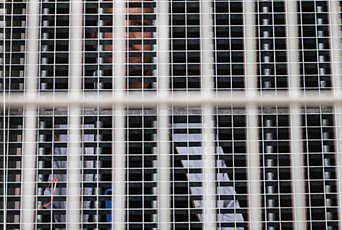An Unprecedented Health Crisis: Didier Fassin on the Global Response to the Covid Pandemic

Didier Fassin is James D. Wolfensohn Professor in the School of Social Science at the Institute for Advanced Study. An anthropologist and sociologist, he was trained as a physician in internal medicine and public health, and focused his early work on the AIDS epidemic and health inequities. He has conducted research in Senegal, Congo, South Africa, Ecuador, and France. An expert on topics including immigration, discrimination, and social justice, he has carried out ethnographic studies on the police and the prison system. Elected to the Annual Chair in Public Health at the Collège de France, he is currently preparing a series of lectures and a book on the anthropology of public health. Confined in his French home near Paris, he spoke over Zoom with Joanne Lipman, IAS Distinguished Journalism Fellow, about the global response to the coronavirus pandemic. This conversation was conducted on May 8, 2020. It has been edited for length and clarity.
Joanne Lipman: Public health experts have been warning about a global pandemic for years. Is Covid-19 playing out as they expected?
Didier Fassin: Everyone agrees on the fact that this health crisis is unprecedented. Yet, it is not unprecedented because of the pandemic, but because of the response to the pandemic.
We have had worse pandemics in the past, but we have never had one for which confinement has been imposed at a global level. The suspension of economic and social activities is what makes this moment unique.
Public health and infectious disease experts have repeatedly announced the coming of such a pandemic, but they have not been heard in most countries, except perhaps in East Asia, where there exists a recent experience of previous epidemics. But neither economists nor, for that matter, social scientists, would have imagined the consequences of the pandemic both in the short and the long term. In that regard, the situation is very different from what we have known with other economic and subsequent social crises, in 2008–2009 for instance. This time, we are in the unknown.
JL: Will the economic damage be more lasting than the pandemic itself?
DF: In terms of duration and depth, the economic and social crisis will last much longer than the pandemic, even if the pandemic continues for several months or even years as some experts predict. But one thing that will be similar to earlier crises is that those who are already in a vulnerable or disadvantaged position will be more severely affected than the rest of the population.
JL: How should we weigh the economic cost versus the human cost in terms of lives?
DF: The uniqueness of the reaction on a global level is that, probably for the first time in history, a majority of governments on the planet have simultaneously decided that saving lives was more important than anything else.
And this “anything else” is a lot. It is not only the interruption of social and economic activities with all that we can foresee in terms of recession, unemployment, and pauperization, but it is also the suspension of civil liberties and fundamental rights—the possibility of circulating, of meeting, of protesting, of going to work or to school. Moreover, in many countries, the declaration of a state of emergency has altered the checks and balances in government. In the United States, the situation varies from state to state, but at the federal level, it is easy to see how the executive branch has increased its power at the expense of the legislative one.
To have as its ultimate goal the saving of lives is valuable, when we think of how certain lives hardly count in a country like the United States. But it has a very high cost and implies huge sacrifices—economically, socially, and politically.
However, even this humanitarian discourse, which consists of saying that saving lives is the ultimate raison d’être of the lockdown, should not be taken for granted. I am not referring here to the false debate between saving lives and saving the economy, which we have heard so often.
Rather, the question we must ask is the following: Is it even true that we are saving lives, and if so, which lives? In other words, there are two interrogations: Who is excluded from this process of saving lives? And how many lives will be lost because of the consequences of the confinement?
JL: To your first question, who is excluded in saving lives?
DF: Let us consider the case of the prisoners. In many countries, including the United States, they are confined in overcrowded prisons. In jails particularly, inmates are either awaiting trial, therefore deemed innocent until proven guilty, or doing time for short sentences due to minor offenses. Not only are they not benefiting from the prevention provided to the rest of the population, but they are even coercively put in situations where they are much more exposed, due to physical promiscuity and restricted medical care. So, instead of protecting them, societies put them at risk. In an Ohio prison, systematic testing has revealed that almost three fourths of the prisoners had been infected.
Other groups are migrants, refugees, and asylum seekers, who are retained in centers or camps under terrible conditions as everyone has been able to see at the southern border with Mexico, where families are crammed in very underequipped centers. We can imagine how quickly the disease can spread in this situation.
Although they are not forcibly confined, many undocumented foreigners who are living, working, and paying taxes in the United States, are now afraid of going to the doctor or to the hospital when they are sick for fear of being denounced and arrested.
It is clear that all these categories of people are not included in this humanitarian politics of saving lives.
JL: To your second question, what will be the collateral damage from the economic fallout?
DF: One of the major blind spots is the following: In order to save lives from the virus, how many will be sacrificed in the coming years due to the consequences of impoverishment, food insecurity, loss of job, health issues?
From recent studies, we know that, in the United States, for the first time in the last 60 years, life expectancy has begun to decline. The cause of this little-known phenomenon is the increase in the mortality of people in the middle ages—that is, between 25 and 64, an age group for which there is an impressive increase of mortality by 6 percent in only 7 years. This trend concerns whites and blacks and Hispanics as well—mostly poor or lower middle class. It started right after the 2008–2009 crisis. The three major medical causes are suicide, alcohol, and overdose in the context of the opioid crisis, all factors which Anne Case and Angus Deaton describe as “deaths of despair.”
This was for the so-called great recession, but the consequences may be even more dire for the one that is coming now. With one major difference. We are presently counting every day the number of deaths due to the coronavirus. But for these other deaths, those due to the economic and social crisis, we will not have a president or an official giving press conferences or newspapers and websites keeping the daily count of the deaths. These deaths will remain largely ignored, being revealed in scientific journals five or ten years from now in a general indifference.
Of course, it would be possible to reduce these costs. They are not ineluctable. One would have to take measures to reduce economic inequalities and have a fairer society. This is particularly true for the United States, which is the most unequal country in the Western world, but it is also true for Europe, Latin America, and elsewhere.
JL: Will cost in terms of lives in Europe be comparable to the U.S.?
DF: Most Western European countries still have a much better system of social protection and medical insurance than the United States.
This is crucial in hard times. A metanalysis of multiple studies conducted after the 2008–2009 recession shows that the European countries which had a better social protection and medical insurance system had less deleterious health consequences. One of the problems facing the United States today is its poorly developed social nets.
JL: How do we make society less unequal? What changes should we make?
DF: We are in a moment of very high expectations. All over the world people want to not just go back to their normal life, which is the post-confinement moment, but beyond that, to live a different life, to have another model of society, which would not be based only on individualism, the search for profit, and the exploitation of the planet, but solidarity, social justice, and the protection of the environment.
The question is, how do we get there? There are two aspects to this question, which have to do with two conceptions of democracy: representative and participative. They are different but not mutually exclusive.
From the perspective of political representation, we can ask, is it possible to change society with the same people, or more broadly, with the same class of people, in government? It is difficult to imagine major transformations when those in power have an interest in not changing the course of things. In the case of the United States, the very question of the representativeness of the various governments is at stake. It is difficult to think that a country where a significant proportion of the population is deprived of the right to vote, where money decides the outcome of elections, where the president is not elected by the majority of voters, where the highest court of justice is dependent on the executive branch, can really be regarded as a representative democracy.
From the perspective of political participation, we should wonder whether citizens, all sorts of citizens, and not just a privileged minority, are not best placed to produce these changes. In the United States, we have seen how the Black Lives Matter and MeToo movements have done more to fight against racial discrimination and police violence and sexual harassment at work, respectively, than governments. So, is it not the case that citizens are best positioned to take responsibility for the change?
JL: As you mentioned, the U.S. is one of the least equal societies. When we come out of this pandemic, will inequality be exacerbated, or will we find a way toward closing the gap?
DF: Definitely, inequalities are and will be exacerbated. The whole question is, will the government try to correct the deepening of inequality? And more generally, does the United States, as a society, accommodate major disparities? It seems that there is in this country a remarkable tolerance of, and even, among various segments of the population, a desire for inequality, which is economic, social, racial, political, even in terms of the value of their lives. So, although the pandemic has generated an awareness of health inequalities, I have little expectation that there will be a substantive response to reduce them.
JL: The next time that there is a pandemic, will we have this kind of global shutdown again?
DF: It is difficult to know. It is reasonable to hope that governments will be able to react quicker. It is reasonable to think that governments will have taken at least the lesson that preparedness should not just be a word, and that the response should be immediate and effective.
Will there be more international cooperation? During the current pandemic, the scientific cooperation has been relatively good, but not the political one. There has been a sometimes-brutal competition over scarce resources, such as masks, tests, or ventilators.
If we are more prepared, more responsive, and more collaborative, there should not be such a strict confinement as we have known, which was only the consequence of the mismanagement of the crisis. The more incompetent governments were, the more rigorous the lockdown had to be.
JL: Are there other issues that we should be paying attention to during this pandemic, but that we aren’t?
DF: The word “attention” is the right word. During the past months, the media, and more generally society, have been incapable of being interested in anything other than our crisis. We have been entirely self-absorbed about what was happening to us, and even when we were looking elsewhere, it was to draw comparison with us. The news has become essentially presentist and ethnocentric. Only the current moment was important. Only what happened in our life was significant.
The rest of the world did not count any more. It is true that, in the United States, even before the pandemic, the ignorance of the state of the world was abyssal among a majority of the population and that the attention of most media beyond the borders of the country, and for many, even beyond the gates of the White House, was close to zero.
But with the pandemic, things have gotten worse. We have lost sight of the thousands of migrants who drowned in the Mediterranean, of the tens of thousands of Yemeni who suffer from famine under Saudi bombs, of the hundreds of thousands of Rohingya trying to flee Bangladesh for Malaysia who are left for weeks drifting at sea. We no longer hear about the Syrian refugees at the Turkish border and the Muslims excluded and persecuted by the Indian government. Taking advantage of the absorption of our attention onto ourselves, China tightens its hold over Hong Kong, India oppresses its Muslim population, and Israel proceeds with the annexation of the West Bank.
Our vision of the world has narrowed. We have become short-sighted about what happens to the majority of human beings because it is remote from our own problems.
JL: Your research has taken you to Africa. How is the coronavirus epidemic playing out there?
DF: One major issue concerns the Global South in the current crisis. On the African continent, in South Asia and in the South Cone, is confinement not endangering people more than the coronavirus? We see that the population of some countries in these parts of the world are already threatened by hunger as they lose their meager resources via the informal economy. People in poor neighborhoods in South Africa and Chile are protesting against the consequences of the confinement. The situation in India is similarly preoccupying.
It is not obvious that what has more or less worked in rich countries to diminish the epidemic should be applied in exactly the same way in poor countries.
JL: What were you working on before the pandemic? Are you still working on it now, or has Covid taken over your life?
DF: Most of this year I have been working on the eight original lectures that I was supposed to deliver at the Collège de France in Paris this spring, and that have been postponed to next spring. The general theme is the anthropology of public health. When the pandemic started, I was already well advanced in the writing of these lectures. Remarkably, I found out that the themes I had chosen seemed extremely relevant to understand the current crisis, and I decided to dedicate the last lecture to the pandemic from the perspective of the first seven.
For instance, I have one chapter titled “The Truth of Numbers,” which is a discussion about the production, interpretation, and use of data, statistics, and predictions, and resonates with the debates about coronavirus. Others deal with conspiracy theories, with ethical crises, and with prisoners’ health. Needless to say, each of those is pertinent to comprehend the current crisis.
Now that I am finished writing a draft of these lectures, I am conducting research on the way the epidemic was handled in France in hospitals, prisons, and hostels for homeless. And I am also responding to journalists...




